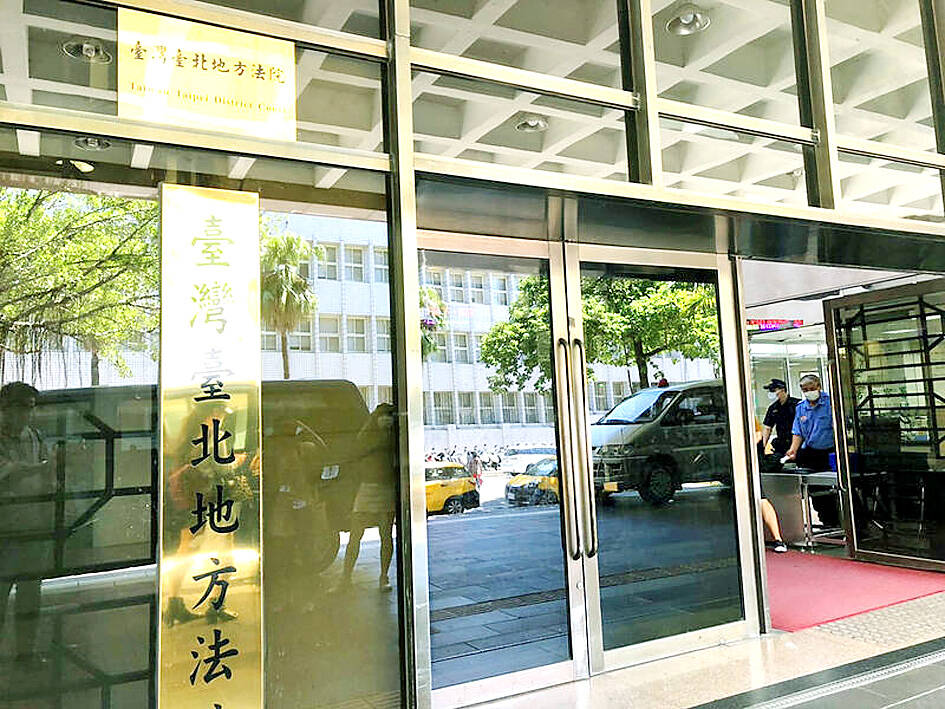Taiwan People’s Communist Party (TPCP) Chairman Lin Te-wang (林德旺) and Vice Chairman Cheng Chien-hsin (鄭建炘) were found not guilty yesterday on charges of Chinese infiltration and attempting to influence elections.
The Taipei District Court has not yet revealed the reasoning behind the verdict, which may be appealed.
Prosecutors yesterday said they would decide whether to appeal after reviewing the court’s written explanation.

Photo: Wang Meng-lun, Taipei Times
The Taipei District Prosecutors’ Office on Oct. 3, 2023, indicted Lin, Cheng and fellow party member Yu Sheng-hung (余聲洪) for allegedly receiving funding from China and illegally importing Chinese-made COVID-19 rapid test kits to bolster the party’s election prospects in 2022.
Prosecutors said Lin and Cheng had been under alleged Chinese influence for more than a decade.
The two were suspected of promoting communism and were indicted for contravening the Public Officials Election and Recall Act (公職人員選舉罷免法) and the Anti-infiltration Act (反滲透法), with prosecutors recommending a heavy sentence.
Both defendants denied all charges during questioning, prosecutors said, adding that they either deflected or minimized the allegations and displayed a poor attitude following their indictment.
Lin, formerly a central committee member of the Chinese Nationalist Party (KMT), had frequently traveled to China since 2006 as a representative of Taiwanese businesspeople, prosecutors said.
He also facilitated multiple cross-strait exchanges, they added.
Lin was expelled from the KMT in 2016 and later ran unsuccessfully for a legislative seat in Tainan’s first electoral district.
In 2017, Lin founded the TPCP, serving as its chairman to the present day.
Prosecutors said that in pursuit of Chinese investment for his business interests, Lin regularly met with government officials from the Political Party Bureau of China’s Taiwan Affairs Office (TAO).
He also invited TAO officials to Taiwan on several occasions and organized delegations to meet with them in China, they added.
Lin maintained a long-standing relationship — spanning more than a decade — with Hu Chunguang (胡春光), an official of the TAO’s Political Party Bureau, prosecutors said.
Hu and officials from the bureau’s Yunnan Province office encouraged Lin to run for Tainan City councilor in 2018, before Lin later instructed Cheng to run for Taipei City councilor in 2022, they added.
In an effort to boost the TPCP’s electoral performance, Lin allegedly received NT$30,000, US$10,000 and 4,700 COVID-19 rapid test kits from the TAO, prosecutors said.
Lin also staged more than 20 protests against a visit to Taipei by then-US House of Representatives speaker Nancy Pelosi in August 2022, during which he planned to distribute NT$500 and the Chinese rapid antigen test kits to protesters mobilized by his party, prosecutors said.

Taiwan is to commence mass production of the Tien Kung (天弓, “Sky Bow”) III, IV and V missiles by the second quarter of this year if the legislature approves the government’s NT$1.25 trillion (US$39.78 billion) special defense budget, an official said yesterday. Commenting on condition of anonymity, a defense official with knowledge of the matter said that the advanced systems are expected to provide crucial capabilities against ballistic and cruise missiles for the proposed “T-Dome,” an advanced, multi-layered air defense network. The Tien Kung III is an air defense missile with a maximum interception altitude of 35km. The Tien Kung IV and V

The disruption of 941 flights in and out of Taiwan due to China’s large-scale military exercises was no accident, but rather the result of a “quasi-blockade” used to simulate creating the air and sea routes needed for an amphibious landing, a military expert said. The disruptions occurred on Tuesday and lasted about 10 hours as China conducted live-fire drills in the Taiwan Strait. The Civil Aviation Administration (CAA) said the exercises affected 857 international flights and 84 domestic flights, affecting more than 100,000 travelers. Su Tzu-yun (蘇紫雲), a research fellow at the government-sponsored Institute for National Defense and Security Research, said the air

Trips for more than 100,000 international and domestic air travelers could be disrupted as China launches a military exercise around Taiwan today, Taiwan’s Civil Aviation Administration (CAA) said yesterday. The exercise could affect nearly 900 flights scheduled to enter the Taipei Flight Information Region (FIR) during the exercise window, it added. A notice issued by the Chinese Civil Aviation Administration showed there would be seven temporary zones around the Taiwan Strait which would be used for live-fire exercises, lasting from 8am to 6pm today. All aircraft are prohibited from entering during exercise, it says. Taipei FIR has 14 international air routes and

Taiwan lacks effective and cost-efficient armaments to intercept rockets, making the planned “T-Dome” interception system necessary, two experts said on Tuesday. The concerns were raised after China’s military fired two waves of rockets during live-fire drills around Taiwan on Tuesday, part of two-day exercises code-named “Justice Mission 2025.” The first wave involved 17 rockets launched at 9am from Pingtan in China’s Fujian Province, according to Lieutenant General Hsieh Jih-sheng (謝日升) of the Office of the Deputy Chief of the General Staff for Intelligence at the Ministry of National Defense. Those rockets landed 70 nautical miles (129.6km) northeast of Keelung without flying over Taiwan,